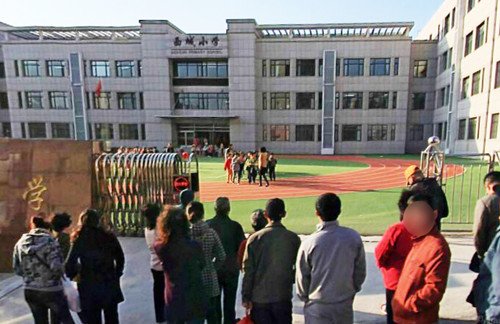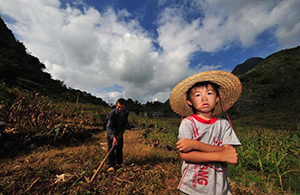Who is to be held accountable for poisonous plastic running tracks?
(China Daily) Updated: 2016-06-06 07:24
 |
|
The parents are standing in front of the primary school.[Photo/Agencies] |
The parents of pupils at a primary school in the Xicheng district of Beijing told the media their children suffer from health problems, which they blame on the school's plastic running track. Ifeng.com comments:
What happened in Xicheng is not an isolated incident. There have been similar reports nationwide about pupils suffering health problems blamed on bad plastic running tracks that prove to not meet the country's quality standards.
In several previous cases, children have developed serious diseases such as leucopenia because of problematic running tracks. Even if the producers of the substandard plastic running tracks and the officials who decided to purchase them are held responsible, the damage caused to the health of these children has already been done.
A detail in the report about the school in Xicheng is parents noted the "irritating odor" from the running track. Didn't the teachers and school staff smell it? Did anybody try to hide the truth? That should be investigated, too.
Another question to be asked is: How could the problematic plastic running tracks pass quality inspections? Last year, when similar scandals happened in Henan, Anhui, and Jiangsu provinces and Shanghai, journalists found that the material used contained toluene 139 times higher than maximum permitted by the national safety standards. The local governments, the schools and the quality supervisors are supposed to protect pupils from plastic running tracks of poor quality but they have obviously failed to do so.
More reports show that the national quality regulations on rubber materials are not without problems, either. The current regulations only set restrictions on the use of a few kinds of poisonous components, while more harmful components are simply not listed in the regulations. That partly explains why sometimes plastic running tracks cause damage to pupils' health but still pass the national quality standards.
It is time to strengthen the safety standards and quality control so as to prevent similar tragedies from happening again.

I’ve lived in China for quite a considerable time including my graduate school years, travelled and worked in a few cities and still choose my destination taking into consideration the density of smog or PM2.5 particulate matter in the region.











